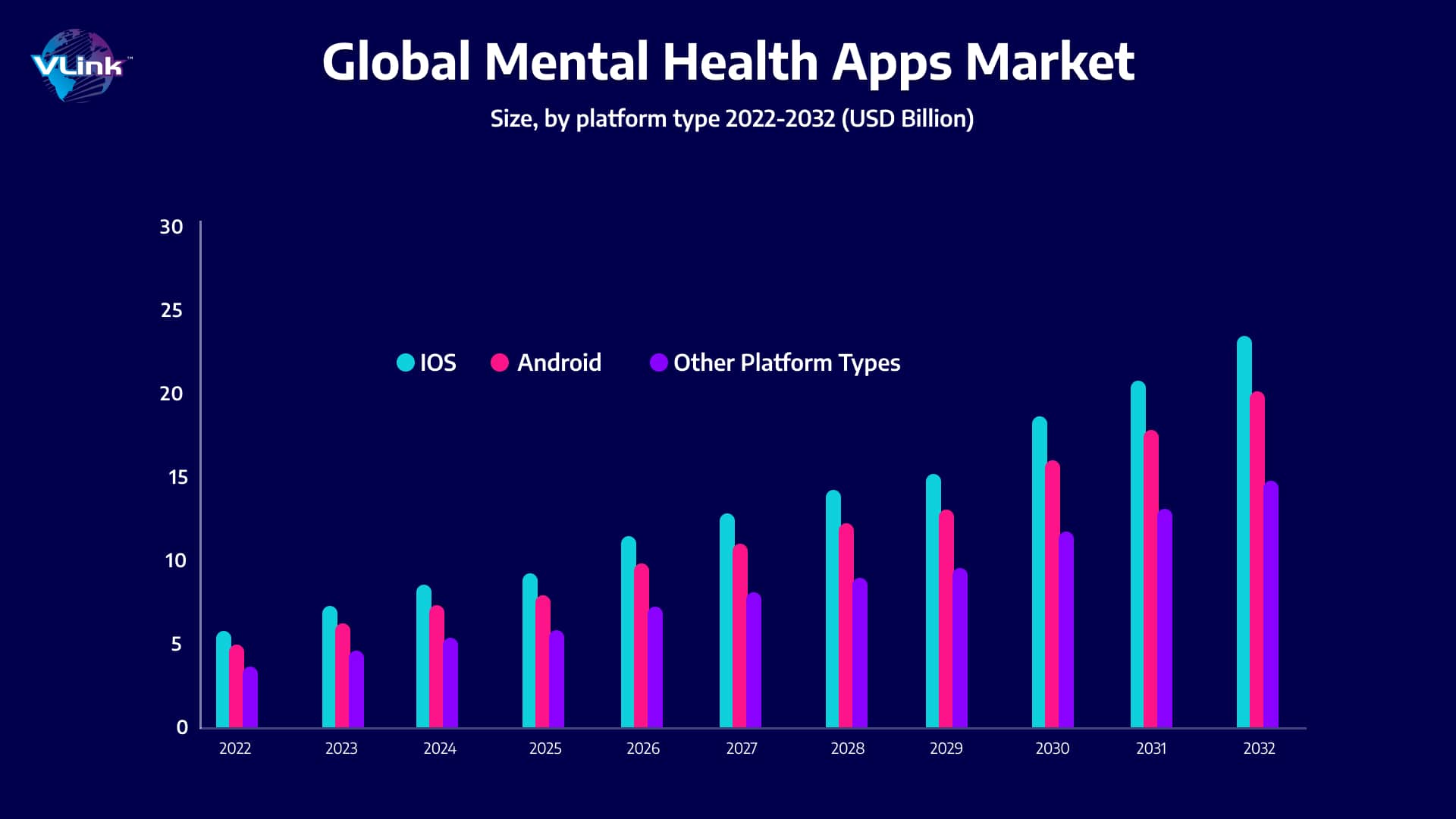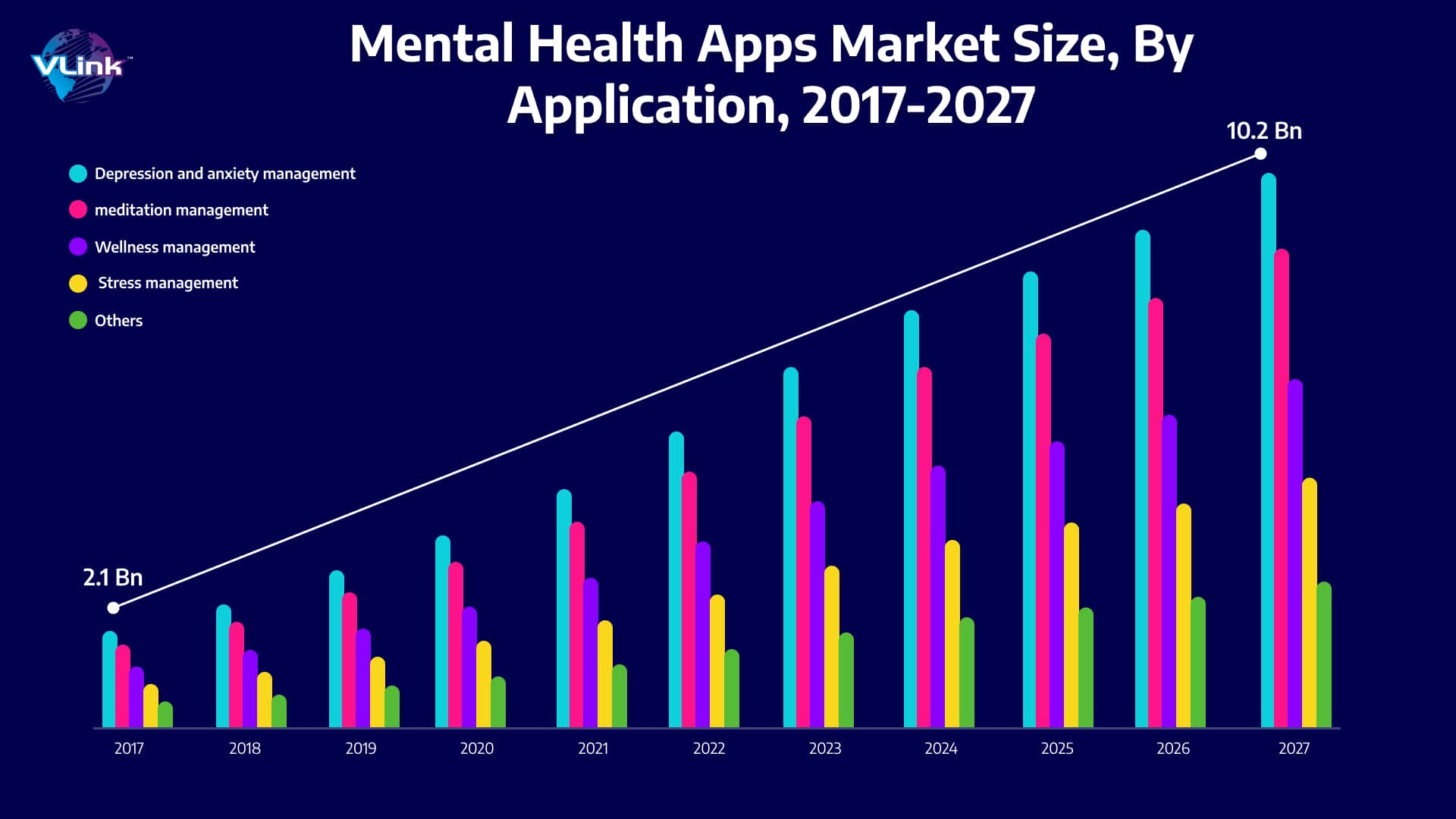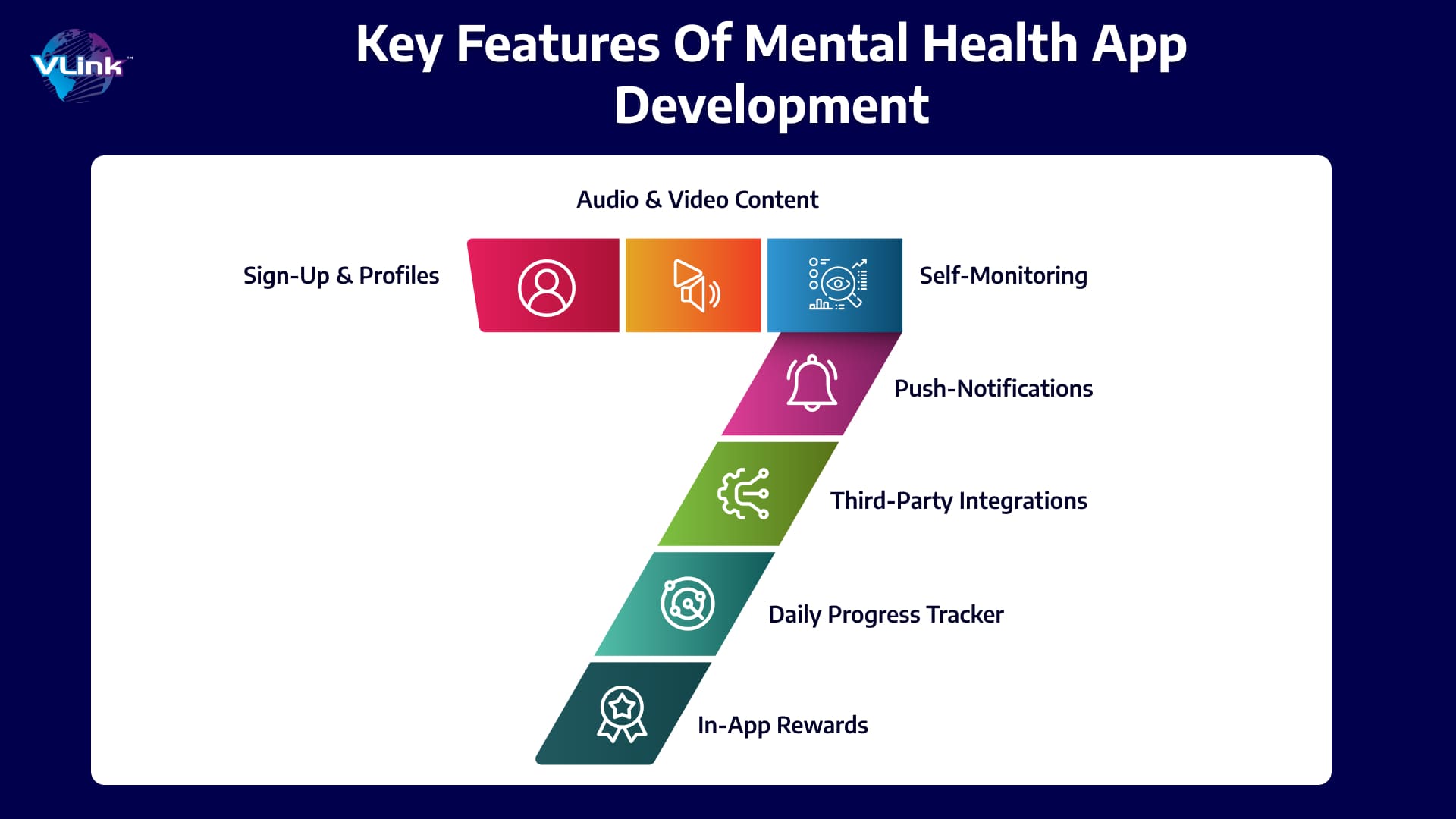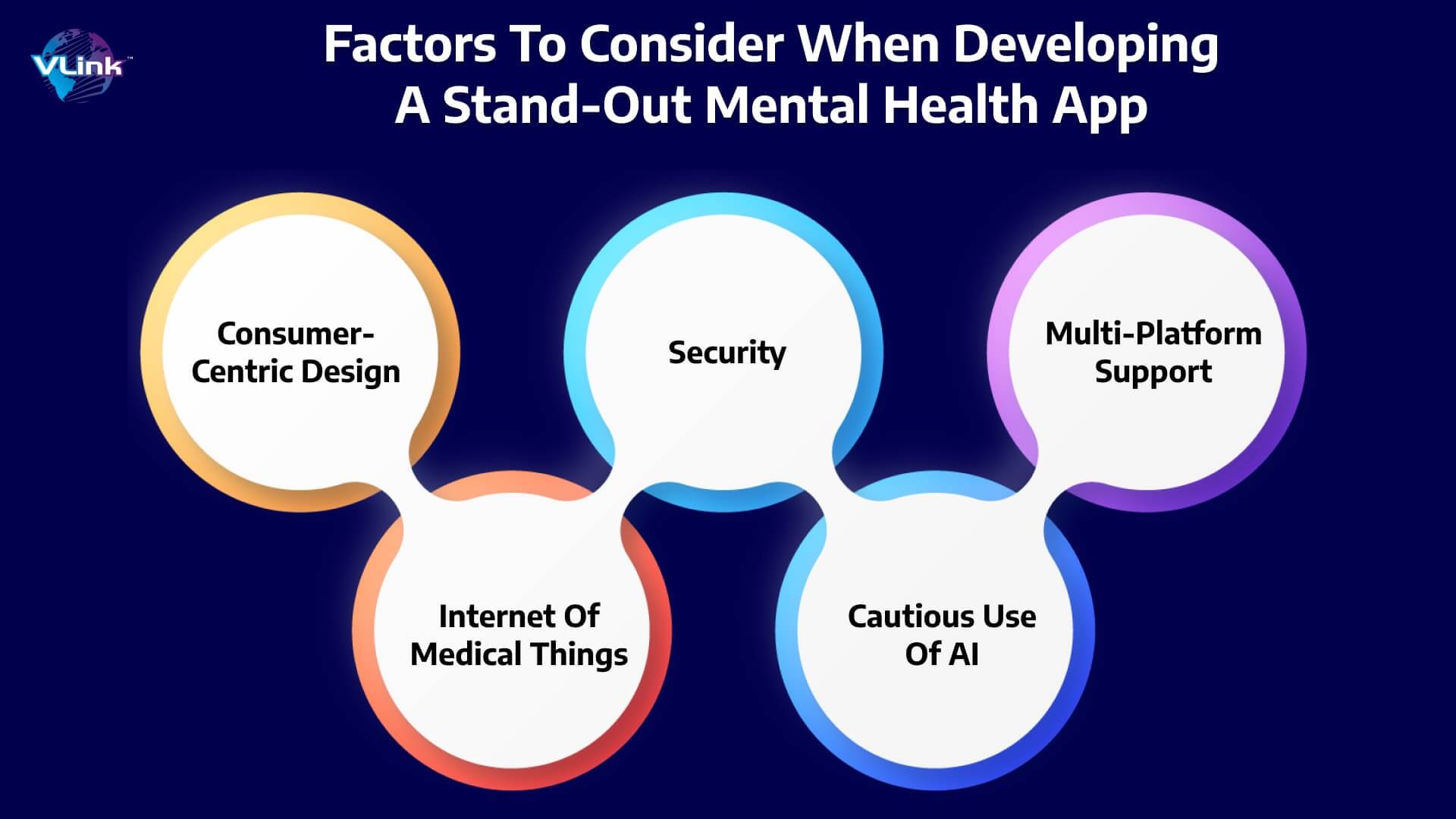The rapid growth in mental health app development is a response to the global mental health crisis. Nearly 1 billion people experience mental disorders. Shockingly, in low-income countries, over 75% of these individuals do not access the necessary treatment. This is where mental health mobile apps play a crucial role.
Projections indicate that the Global Mental Health Apps Market is poised to reach approximately USD 23.8 bn by 2032, a substantial increase from its 2022 value of USD 5.2 bn, with a robust CAGR of 16.9%.

Here are reasons why mental health applications are essential:
- Increase efficiency for healthcare providers
- Encourage a healthy lifestyle
- Reduce costs for patients
- Enhance patient-doctor communications
- Gather better health data
- Improve patient engagement
In this blog, we will explore the mental health app development guide, from features, cost, and security to tech stack. Let's start with the mental health app definition:
What is a Mental Health App?
Mental health applications are an easy & convenient way to improve mental health and to get extra help in between sessions or office visits. They provide ongoing support even after therapy. Mobile apps for mental awareness may offer daily practice exercises, motivation, and other resources.
Here are different types of mental health apps;
- Depression & Anxiety Management Apps
- Meditation Management Apps
- Stress Management Apps
- Suicide Awareness Apps
- Mental Health Tracker Apps and many more.
The mental health app development market size, by application types in bn (2017-2027), is shown below figure:

Why Should You Invest in Mental Health App Development Solution?
Here are several benefits of investing in mental health app development solutions in the healthcare industry.
- Provides additional value to your clients and patients by making your services more accessible
- Helps users within the comfort of their home
- Aids business owners to build trust and credibility
- Reduces paperwork by managing the patient's massive value with ease
- Improves communication with patients
Here are mental health apps development market stats by 2023:
- By platform type, the iOS segment hit the highest market share of around 47% in 2022. However, the Android segment is increasing at the fastest rate (2023-2032).
- By application, the depression and anxiety management segment has held a market share of around 26%.
- North America has held the highest revenue share of about 38.5% in 2022.
- Out of the 700,000 health apps available, 29% (203,000) are Mental Health related.
- Mental awareness app development is expected to reach USD 19.6 Billion by 2030
Must-Have Features to Create a Mental Health App
Here are key features of on-demand mental health mobile app development solutions:

Registration is essential to build mental health platforms as it helps to reach specific objectives. Usually, the user experience begins with registration. That's why it must be simple and easy to use. You can also include other options for signing up, such as social media accounts.
Another feature you should implement into your mental awareness app is audio and video messaging. It helps patients to get online therapy consultations from therapists.
They can use the chat feature to interact with their therapists if they feel uncomfortable speaking on the phone or through a video conference. Its adaptability makes them more willing to talk about their issues.
Through this feature, patients can keep track of their eating and exercise habits, symptoms, sleeping patterns, emotions, and other mental and emotional states.
Users have the option to do their own data analysis or delegate it to an expert. You can also include calendar and checklist features to improve the convenience and usability of self-monitoring.
Push notifications maintain user engagement and foster customer relationships. You can integrate this feature to get this advantage. For example, send out a reminder about an upcoming session to demonstrate your concern for the users or offer a promo code or a free session to users.
You may want to measure specific physical indicators (like blood pressure, heart rate, activities, sleeping patterns, etc.) and attach them to the user's profile, depending on the type of mental health app. You'll need to connect your app to wearable devices to use these features.
You'll need an Apple HealthKit healthcare API, which facilitates data transfer from fitness apps and devices.
Also, here are the following mobile app development technologies to build software to track mental health.
- Google Calendar, Nylas, and Zoho for calendar feature
- OneSignal or Pusher for notifications
- Sendbird, Stream, or Vonage for chats
- Agora, Twilio, or VidRTC for video sessions
- Daily Progress Tracker
A mental health app must have a daily progress tracker to help the therapist check their patients' data. It will then produce a graphical representation or statistical chart. The daily, monthly, and annual progress of the patient will be shown on the graph.
Patients should receive in-app rewards for reaching specific milestones so that they are motivated to keep up their progress and use the various features of your mental health app to better themselves.
Vouchers or discount coupons are two options that encourage them to advance in their development. Also, include free sessions to help patients in obtaining something worthwhile.
Factors to Consider When Developing a Stand-Out Mental Health App

Here are several factors you need to consider before building a mental health app.
Design is crucial for building credibility and trust. Here are several things you need to ensure;
- Smooth onboarding process
- UX that follows the platform trends
It will help you understand whether your app will win users' hearts or leave it.
One of the most crucial considerations when choosing to create a mental health app is data security. It would help if you took great care to protect users' privacy. All healthcare solutions must abide by following mandatory regulations.
- HIPAA (Health Insurance Portability and Accountability Act)
- GDPR (General Data Protection Regulation)
- PIPEDA (The Personal Information Protection and Electronic Documents Act)
Here are steps to prevent data breaches and enable high-level security:
- Use multiple forms of authentication, such as voice recognition, face ID, fingerprints, passwords, and phone call/message verification.
- Employ end-to-end encryption to ensure that a message is only read by the sender and the recipient.
- Configure fraud alerts to inform users in the event of a data breach or if someone attempts to log in using an unfamiliar device.
Nowadays, a consumer usually alternates between laptops and smartphones for the day. If the recipient is a tech enthusiast, include a tablet or smartwatch.
While it might be challenging to implement right away, your product must adapt to the needs of the user across all of these channels.
Never avoid the information about your customers' physical activity that you can obtain from wearables and smartphones. You already know that a healthy body is necessary for a healthy mind. Through IoMT, early detection of activity discrepancies in patients may aid in the development of a more effective treatment plan.
AI integration can make or break your therapy or mental health app. You cannot depend on using actual patients to train your healthcare machine-learning algorithms with this kind of application. Additionally, a smooth human handoff option ought to always be available.
Step-by-Step Guide to Building a Successful Mental Health App
If you want to stand out in the market, you must have a solid and imaginative idea. Consider your target audience and how your solution will benefit users before developing the app.
Here are initial exploration questions to build the concept into a business plan:
- What user are you?
- What distinguishes you?
- How will you monetize your app?
When it comes to building a successful mobile app, the right choice of developers matters. A dedicated development team can strengthen your ideas, assist in marketplace research, and help you achieve the desired results. Check the portfolio with relevant cases and verify credentials to find the right experts for your development solutions.
Follow these tips to code the mental health app development solution on time:
- Use third-party audio/video calling SDKs that comply with HIPAA regulations to build a telemedicine therapy app.
- Utilize chat with audio messages to speed up delivery.
- Configure the DevOps pipeline to free up developers' time for non-essential work.
- Observe HIPAA regulations and best practices for cybersecurity.
Testing plays a vital role in app development process. Here are different types of software testing services you need to follow for high-performance mental health apps.
- Functional testing
- Performance testing
- Compatibility testing
- Interface testing
- Unit testing
- Stress testing
- Security testing
After testing your application, it's ready to release. Use the DevOps strategy to keep the maintenance costs down.
Once launched, the mental awareness app will feed you user engagement data. It will drive further mobile software updates, identifying new growth areas.
How Much Does It Cost to Develop a Feature-Rich Mental Health App?
Mental health app development costs vary depending on the project scope, the app's type, and the choice of platforms.
- The cost to build a teletherapy app may start at around $140,000.
- A simple mood-tracking app with self-monitoring features costs may start at around $70,000.
Biggest Challenges in Mental Health App Development
Here are four significant challenges business owners or developers face when building a mental health app:
Maintaining user engagement is a significant challenge in the development of mental health apps. Users must use these apps regularly for them to be effective. If the UI or content isn't engaging enough, users might quickly become disinterested and remove the app.
As mental health is very individualized, what's practical for one person may not be effective for another. Healthcare mobile apps must have the ability to be customized to each user's unique requirements and preferences, but developing such adaptive algorithms and features can be challenging.
Offering users value is essential. But developers also need to follow sustainable monetization strategies that don't take advantage of users' weaknesses. It can take time and effort to find the ideal balance between profitability and offering sincere assistance.
There is a greater need to protect user data on mental health apps because of the sensitive nature of the information shared there. It needs robust data handling protocols and complex encryption.
As you can see, it's very challenging to build a successful and secure mental health app for Android or iOS. So, experts advise hiring a highly skilled development team from an on-demand mental health app development company.
Hire Experienced Mental Health App Developers from VLink!
At VLink, we have a dedicated team of experienced developers who have a proven track record of building compliant, interoperable, and user-friendly mobile apps. With our deep industry knowledge and top-notch development skills, our experts can build both native and cross-platform mobile apps, whether you're starting from scratch or scaling up an existing solution.
To hire developers for your mental health app development project, contact us!
Frequently Asked Questions
It would help if you considered the following technologies to build an AI-integrated mental health app.
- Natural language processing (NLP) for text analysis,
- Machine learning for personalized recommendations and insights,
- Secure cloud managed infrastructure services for data storage,
- Mobile app development frameworks for user interfaces.
- Data encryption and user privacy safeguards are also essential components.
The time to create a mental health app varies depending on factors like complexity, features, and team size. A simple app may take a few months, while a comprehensive, AI-integrated solution could require a year or more. Planning, development, testing, and regulatory compliance are critical determinants of the timeline.
Yes, a mental fitness app that collects and stores users' protected health information (PHI) should be HIPAA compliant in the United States to ensure the security and privacy of sensitive healthcare data.
Monetization strategies for mental health apps include:
- Subscription models.
- In-app purchases for premium content.
- Offering a free basic version with paid add-ons.
- Partnerships with healthcare providers.
- Sponsored content and advertising.









